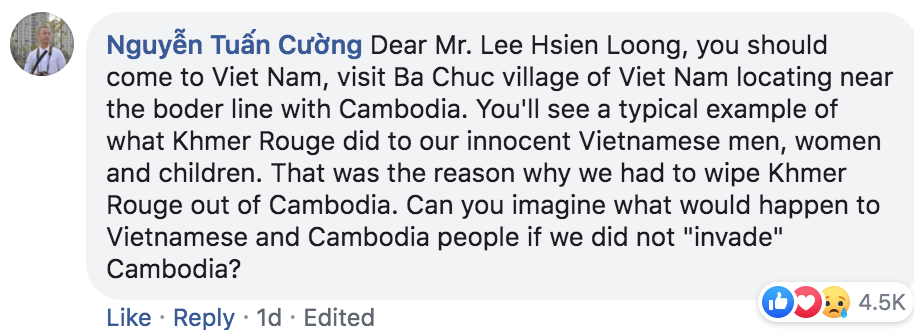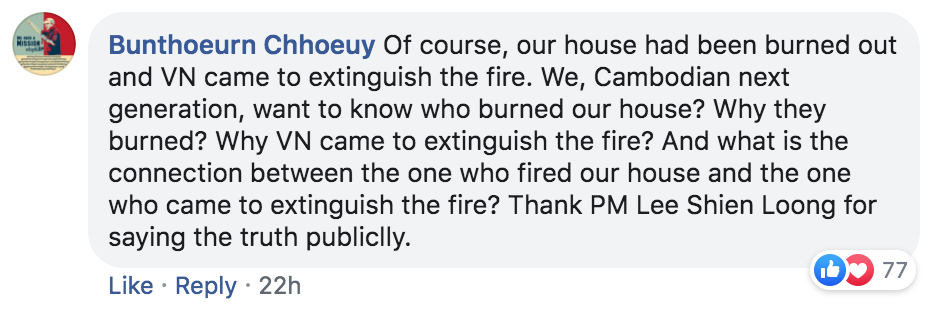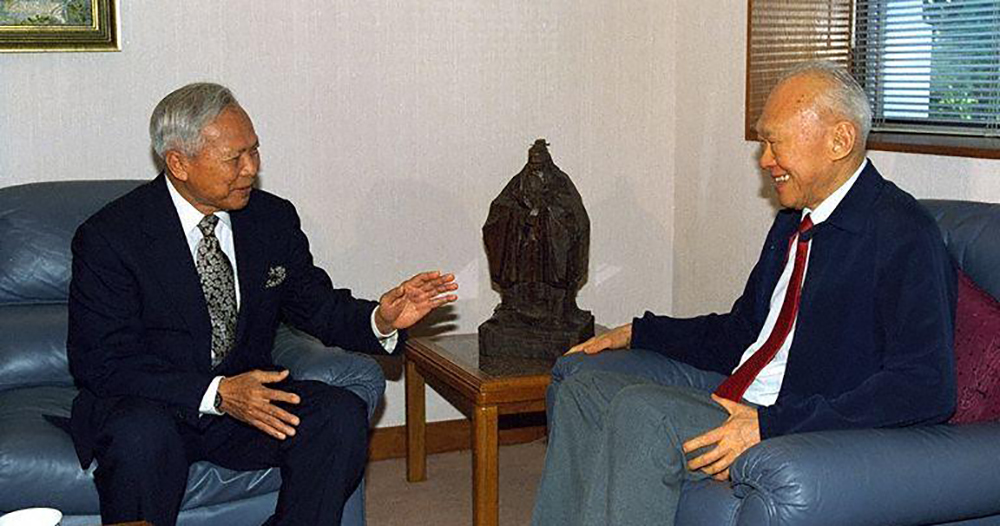Singapore Prime Minister Lee Hsien Loong has sparked a flurry of anger in the neighbouring countries of Vietnam and Cambodia with a Facebook post that touched on the Vietnamese invasion of Cambodia in 1978.
Expressed condolences for a deceased Thai general
On May 31, a post on PM Lee's Facebook page detailed his expression of condolences to Thai Prime Minister, Prayut Chan-ocha, over the passing of Thai general Prem Tinsulanonda.
PM Lee praised Prem for his leadership in the post, noting that he had served as Thailand's Prime Minister, at the time of Vietnam's invasion of Cambodia, and Asean's subsequent opposition to the government that had replaced the Khmer Rouge.PM Lee elaborated on the situation facing Thailand at that time, highlighting that the country faced Vietnamese forces just across its border in Cambodia.
Prem was against this outcome, and cooperated with Asean (then comprised of Thailand, Malaysia, Indonesia, the Philippines and Singapore) to oppose the Vietnamese occupation at international platforms.
PM Lee added that this prevented Vietnam's military invasion and regime change from being legitimised, and protected the security of the other Southeast Asian countries.
Made similar remarks at Shangri-La Dialogue
Later on, PM Lee mentioned this matter briefly as well at his keynote address at the Shangri-La Dialogue, an annual high-profile security summit.
While describing the formation of Asean, he said Vietnam had "invaded Cambodia, thus posing a serious threat to its non-communist neighbours".
Vietnam reacts
Both Vietnam and Cambodia have rebutted PM Lee’s statement though.
Vietnam expressed regret that the statement does not objectively reflect the historical truth, Vietnam Net Global reported.
Responding to media queries on June 4, Le Thi The Hang, the spokesperson of Vietnam’s Ministry of Foreign Affairs (MFA) said the contribution and sacrifice of Vietnam in the joint efforts with Cambodian people to end the Khmer Rouge genocide regime have been “widely recognised”.
She added that Vietnam’s MFA had discussed the issue with its Singaporean counterpart.
Cambodia reacts
Cambodian Defence Minister Tea Banh raised his objections to the statement too.
According to Cambodian English-language paper Khmer Times, Banh remarked on Monday night (June 3) that the statement does not reflect history”.
“It is not true because he said Vietnamese troops invaded Cambodia. We wish for him to make corrections,” he said.
Banh further remarked that Cambodians would not have survived if Heng Samrin’s forces had not allied with the Vietnamese.
Heng was the pro-Vietnamese Communist Cambodian politician installed by Vietnam in the new government set up in Cambodia after Vietnamese actions overthrew the Khmer Rouge regime.
“We cannot accept what he said. Vietnamese volunteer troops came to liberate our people. We still consider them as saviours — this means a lot for us,” Banh added.
Banh also claimed to have asked Singaporean counterpart Ng Eng Hen to bring up the issue with PM Lee.
In addition, Cambodian legislator Hun Many, the fifth son of Cambodian prime minister Hun Sen, said his father's Cambodian People's Party had saved more Cambodians from suffering with the help of Vietnam, the Phnom Penh Post reported.
Backlash triggered among netizens
Several Vietnamese netizens took offence at the statement.
They objected to the use of the word "invasion", preferring words such as "liberation" instead as Vietnamese troops were seen domestically as putting an end to the Cambodian genocide carried out by the Khmer Rouge regime in the 1970s.





Nevertheless, there were both Cambodian and Vietnamese netizens who disagreed with such comments.


Why did Vietnam invade Cambodia?
On December 1978, Vietnamese troops invaded Cambodia and toppled the Khmer Rouge government, which ended up being expelled from Phnom Penh on January 7, 1979.
In citing the study of East German secret police files by German historian Bernd Schaefer, the Khmer Times reported that a major reason for the invasion was to ensure the security of Vietnam.
This was because in 1977, the Khmer Rouge had started launching raids into Vietnamese territory, killing thousands of Vietnamese civilians.
Justification for such raids was given by the Khmer Rouge's rhetoric of wanting to conquer lands that had historically been part of the Khmer empire.
As such, the aim of Vietnam's invasion was to primarily depose of Pol Pot and install a new government that was friendly to itself.
Overstayed their welcome
Schaefer added that while it was a fact that the Khmer Rouge regime was deposed by the Vietnamese, the invasion had not been undertaken on humanitarian grounds, to end the genocide perpetuated by the Khmer Rouge that had killed around one-quarter of Cambodia's population.
"They (Vietnam) did not primarily act because they wanted to end the genocide.
They wanted to get rid of an anti-Vietnam government, and put in a pro-Vietnam government. And in doing so, they got rid of the Khmer Rouge government. And that is a fact.”
The BBC also reported that while the Cambodians initially welcomed the Vietnamese as liberators, the former eventually started to resent the latter as occupiers when the Vietnamese remained in the country for about 10 years until 1989.
Asean's stance on the invasion
Former deputy prime minister Wong Kan Seng gave Asean's stance on the issue, saying in 2011 that the objectives of resolving the occupation was three-fold:
- That the Vietnamese occupation of Cambodia be prevented from becoming a fait accompli (an irreversible outcome),
- That Vietnam be persuaded to come to the negotiating table, and
- That a peaceful, negotiated settlement which allowed the Cambodian people the right to self-determination and independence be ensured.
On the status of the Khmer Rouge, Wong articulated Asean's position as the following:
"We did not seek a restoration of the status quo ante which would have seen a return of the Khmer Rouge. That was unacceptable."
Remained firm in the face of pressure from China & the U.S.
Complicating matters was China objecting to the disarmament of the Khmer Rouge as it was pressuring Asean at that time to adopt a more conciliatory tone.
The U.S. also pressured Asean to back down in favour of China's position.
Ultimately, Asean managed to stand firm, and a resolution sponsored by Asean that condemned the Khmer Rouge was passed in 1988.
Singapore's stance on the matter
Wong also offered a Singapore perspective on the issue.
He explained that Singapore, together with Asean, lobbied for the issue to be kept in international consciousness, deny Vietnam the chance to claim Cambodia's seat at the United Nations General Assembly, and to persuade Vietnam to come to the negotiating table.
Saying that Singapore held firm to its principles, he said the issue for Singapore was that “Vietnam’s invasion of Cambodia was a clear sense of violation of international borders and an act of external aggression”.
If left unopposed, it would have established an “undesirable precedent of international relations”.
“It was external interference on the basis of internal developments,” he said.
“We had to respond. Anything less would have undermined our credibility and posed serious implications for our own security.”
He added that Asean was aware that what was happening in Cambodia was “essentially a Sino-Soviet proxy war”.
Vietnam had the support of the Soviet bloc, while China, which had become openly opposed to the Soviet Union since the early 1960s, had a keen interest in the issue, as seen from its “attack on Vietnam on February 1979”.
Still a sensitive issue
The Cambodian-Vietnamese war has remained sensitive to this day.
Occidental College associate professor Sophal Ear, who survived the Khmer Rouge regime, told the South China Morning Post (SCMP) that PM Lee's statement was "factually correct" and that "Vietnam had invaded Cambodia".
However, things are not as simple when it comes to the parties involved.
Within Cambodia, Phnom Penh "wants to rewrite history" and have everyone who opposed the Vietnamese-backed regime in the 1980s apologise as anyone against them was seen as being pro-Khmer Rouge.
There is also the idea in Cambodia that the country is somewhat subservient to Vietnam, Joshua Kurlantzick, a senior fellow at the Council on Foreign Relations told SCMP.
Also, while some Cambodians did see Vietnamese forces as liberators, anti-Vietnam sentiment is still regularly utilised by Cambodian politicians, he said.
Top image via Lee Hsien Loong's Facebook
If you like what you read, follow us on Facebook, Instagram, Twitter and Telegram to get the latest updates.
